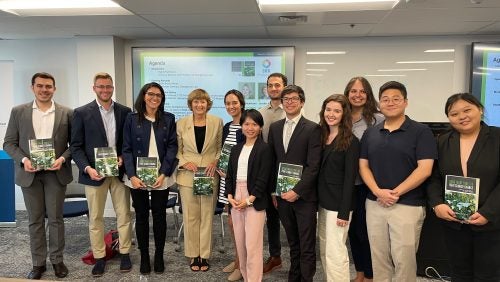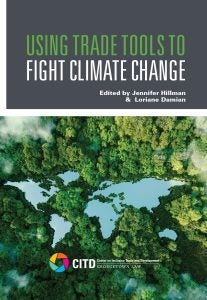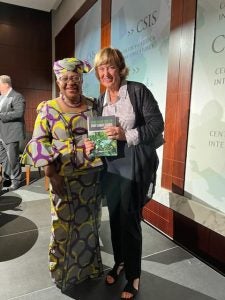Student Assignments Become New Book on Global Trade Solutions to Climate Change
October 12, 2023

Prof. Jennifer Hillman, center, with students whose work became a new book on trade and climate change.
Students often learn from books their professors have written, but in the case of one recent Georgetown Law seminar, the professor was so impressed by her students’ papers, she turned them into a book.
Two years ago, Professor from Practice Jennifer Hillman, co-director of the Center on Inclusive Trade and Development, led a writing seminar on trade and climate change in which she asked her students to dive deep into trade law to find practical decarbonization solutions.

The cover of the new book that came out of Hillman’s seminar
“When I think about what area of trade will have the potential to be the most impactful on the world, there is no doubt it is the link between trade and climate change,” Hillman said. “We brought together students from all over the world – people with a lot of experience on the environment side and others who had a lot of experience on the trade side. What came out was a little bit of magic! I just couldn’t bear the thought of leaving the resulting papers on my desk. There was too much in here that needed to get out into the world.”
Hillman, with the help of CITD research assistant Loriane Damian, L’23, compiled the papers written by the 27 seminar students into Using Trade Tools to Fight Climate Change, a new book published via an Amazon.com platform. The 490-page book tackles subjects ranging from decarbonization in the steel industry to steps President Biden could take to declare climate change a security crisis.
Hillman shared the book with trade leaders at a recent global meeting of the World Trade Organization, and Director-General Dr. Ngozi Okonjo-Iweala even gave the book her endorsement with a quote on the cover: “The climate crisis is one of the defining issues of our time, and one for which trade and trade policies ought to be part of the solution… [The book] brings some young and fresh perspectives to examine different ways in which trade can be a force for good and a key driver to achieving the low-carbon economy, climate resilience, and just transition that our world so urgently needs.”

World Trade Organization Director-General Dr. Ngozi Okonjo-Iweala and Prof. Jennifer Hillman
Recently, CITD hosted some of the book’s contributors on campus to discuss their ideas with an audience of climate nonprofit leaders, academics and students. Mine Orer, L’23, who will soon start working at the international law firm Sidley Austin in its Global Arbitration, Trade and Advocacy practice, spoke about her proposal to model a global trade agreement on fossil fuel subsidies on the WTO Agreement on Fisheries Subsidies, adopted in 2022. “The recent Fisheries Subsidies Agreement was the first time sector-specific subsidies have been regulated, as opposed to restricting subsidies based on their trade-distorting effects. It was also the first time environmental concerns were at the forefront of subsidy discussions,” said Orer. “While that agreement took years to reach, the lessons learned can help guide negotiations about fossil fuel.”
Paul Suk, L’24, wrote about how nations’ policies prioritizing the domestic economy distorts world trade and worsens climate change. For example, the 2022 Inflation Reduction Act was enacted to spur low-emission investment in the United States, but its local content requirements (LCRs) in the electric vehicle tax credit program violate WTO rules. Noting that the LCRs distort the global market for electric vehicle components, Suk proposed imposing expiration dates on LCRs, requiring reporting data on how they impact trade and compelling countries with LCRs to contribute to existing climate funds.
Suk, who is very interested in working in the Korean manufacturing industry after graduation, said that researching his paper was an invaluable experience.
“Georgetown Law has great faculty and being a part of this book was a unique way to learn about the real-world implications of policy on trade and the environment,” he said.